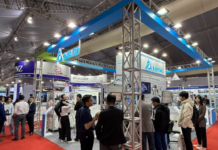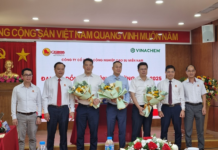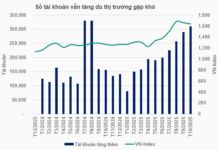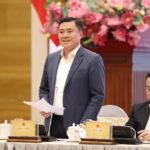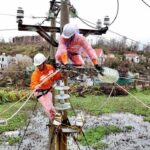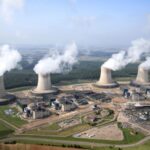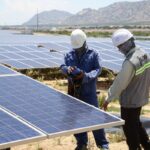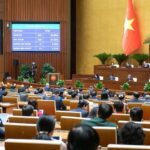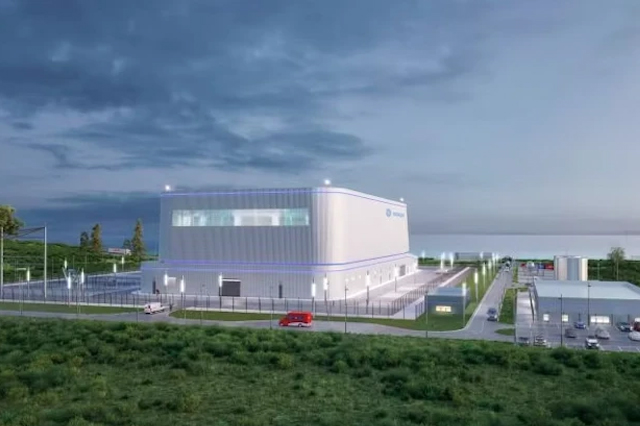
Taking a Look at the BWRX-300 Nuclear Power Plant in the UK (Source: GEH)
|
Vietnam should explore the feasibility of adopting small modular nuclear reactor technology, currently being deployed in the UK.
This was one of the key points discussed by Dr. Dao Duc Cuong, from the University of Bradford’s Mechanical and Energy Engineering Department, in an interview with a correspondent from the Vietnam News Agency in London, regarding the UK’s current nuclear energy policies.
With regards to the UK’s nuclear industry, Dr. Cuong shared that the UK was the first country in the world to construct a commercial nuclear power plant and has nearly 70 years of experience in developing and operating nuclear power.
Nuclear energy continues to play a significant role in the UK’s energy mix, contributing approximately 14-15% of the country’s total electricity generation, ranking third after gas and wind power.
Despite differences in approaches, the UK government and political parties unanimously recognize the importance of nuclear power and aim to maintain this energy source due to its clean and safe nature.
To ensure energy security and achieve the net-zero emissions target by 2050, the UK advocates for the continued importance of nuclear power alongside the development of renewable energy sources such as wind power.

Dr. Dao Duc Cuong, Lecturer at the University of Bradford’s Mechanical and Energy Engineering Department. (Photo: VNA)
|
The UK government has even set a target to increase the contribution of nuclear power to the country’s energy mix to 25% by 2050.
In relation to Vietnam’s restart of its nuclear power development program, Dr. Cuong assessed that at the present time, Vietnam’s economic conditions and energy development and utilization structure have changed significantly. Therefore, the diversification of energy sources and the development of clean energy, such as renewable energy and nuclear power, are inevitable trends.
He highlighted Vietnam’s advantages in sustainable energy and its years of research, surveys, and legal foundations for nuclear power development.
However, Dr. Cuong also pointed out several challenges for Vietnam. Firstly, nuclear power projects are capital-intensive and require a long time to develop and construct, thus necessitating thorough economic and technical feasibility studies before implementation.
Secondly, as this would be Vietnam’s first nuclear power plant project, the main obstacles are the lack of technological mastery and experience in constructing, installing, managing, and operating such a facility. Therefore, Vietnam needs to conduct thorough research and assessments when choosing the right partners and technology, especially when evaluating economic and technical feasibility.
Additionally, Vietnam should have a team of experts to assess potential risks to avoid project delays, cost increases, and reduced competitiveness of nuclear power compared to other energy sources.
In parallel, Vietnam should also enhance its domestic capacity to participate in the construction, installation, and operational deployment of the plant in the future.
Regarding learning from the experiences of other countries, Dr. Cuong recommended that Vietnam could cooperate with nuclear powerhouses, including the UK, in building the plant and coordinating the dispatch of Vietnamese officials and experts to partner countries for training and capacity-building.
He shared that the UK government is currently working on several research projects utilizing small modular reactors (SMRs) with the expectation of starting construction and operation in the 2030s, aiming towards the net-zero emissions target by 2050.
SMRs offer advantages such as faster development and construction times, flexibility in use and operation, and despite their smaller capacity (under 300MW), a large number can be built to increase overall capacity. This technology holds promise as one of the future options for nuclear power.
Vietnam should explore the feasibility of adopting this technology, especially as commercial costs decrease and electricity demand increases to support economic development.
Dr. Cuong also emphasized the importance of nuclear waste management. He noted that Vietnam has the Atomic Energy Law, which includes provisions related to nuclear waste management. When choosing construction partners, Vietnam should establish specialized agencies and concretize waste management procedures applicable to the country.
Nuclear waste management should be addressed in parallel with the construction of nuclear power plants.
Phong Ha
“The Multi-Billion Dollar Question: Unveiling the Total Investment Cost of the Ninh Thuan Nuclear Power Project”
At the regular Government press conference for November 2024, held on the afternoon of December 7th, Deputy Minister of Industry and Trade, Nguyen Sinh Nhat Tan, shared a plethora of information pertaining to the Ninh Thuan nuclear power project.
The Future of Electricity Pricing: A Market-Driven Approach
According to the Ministry of Industry and Trade and industry experts, the newly amended Power Law, passed by the National Assembly, will bring about significant changes in legal regulations. This will untie the knots hindering the development of the electricity industry, particularly in terms of capital mechanisms and investment incentives to attract resources for electricity development and operation.
The Nuclear Option: Reviving the Ninh Thuan Project – A Triple Optimized Solution
The revival of the Ninh Thuan Nuclear Power Project is touted as an optimal choice, a triple threat solution: guaranteeing proven technology, swiftly boosting large-scale power supply, and significantly reducing wastefulness by saving time, money, and manpower.
Unlocking New Frontiers in Energy: The Amended Power Law Lights the Way for Innovative Electricity Ventures
On November 30, the National Assembly passed the amended Power Law with an overwhelming majority of 439 out of 463 delegates voting in favor, accounting for 91.65%. This pivotal piece of legislation carries significant weight, impacting the economy and ensuring the nation’s growth, development, and energy security.


